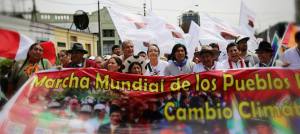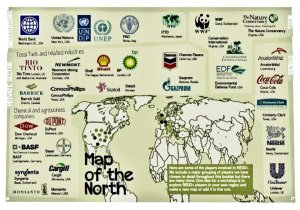Stop the disastrous REDD+ experiment!
We are united to oppose and reject the commodification, privatization and plunder of Nature, which include REDD+ and other market-based mechanisms including biodiversity and conservation offsets that put profit above the well being of humanity and the planet.
Read the full Durban Declaration below and sign it today!
| 70 | Ms gtROhfXVMAAsCGBCOIltda V. | Dec 31, 2025 |
| 69 | Ms Oduduabasi A. | Sep 19, 2022 |
| 68 | Ms Matilda S. | Jun 03, 2020 |
| 67 | Ms Leonarda D. | Jan 19, 2018 |
| 66 | Joanne S. | Dec 01, 2017 |
| 65 | N. T. | May 31, 2017 |
| 64 | Thando M. | Mar 26, 2017 |
| 63 | Kamra B. | Nov 28, 2016 |
| 62 | Maryanne E. | Nov 28, 2016 |
| 61 | Kathleen F N. | Nov 18, 2016 |
| 60 | Jessica M. | Nov 16, 2016 |
| 59 | Salle D. | Dec 13, 2015 |
| 58 | Mary Ellen D. | Dec 10, 2015 |
| 57 | Sherry S. | Dec 10, 2015 |
| 56 | johnny l. | Dec 10, 2015 |
| 55 | Tabitha T. | Dec 09, 2015 |
| 54 | Tamhas G. | Dec 01, 2015 |
| 53 | Mark P. | Dec 01, 2015 |
| 52 | Robben C. | Nov 30, 2015 |
| 51 | Lili S. | Nov 27, 2015 |
| 50 | Kelly A. | Nov 26, 2015 |
| 49 | Marie P. | Nov 25, 2015 |
| 48 | Bruce A. | Nov 23, 2015 |
| 47 | Leslie W. | Nov 22, 2015 |
| 46 | robert j. | Nov 22, 2015 |
| 45 | Ann L. | Nov 22, 2015 |
| 44 | Hazel L. | Nov 22, 2015 |
| 43 | Paloma K. | Nov 22, 2015 |
| 42 | CISSY P. | Nov 22, 2015 |
| 41 | scott c. | Nov 21, 2015 |
| 40 | Alejandro L. | Nov 21, 2015 |
| 39 | Dorothy Z. | Nov 21, 2015 |
| 38 | Barbars S. | Nov 21, 2015 |
| 37 | Michelle L. | Nov 21, 2015 |
| 36 | Gabriel H. | Nov 21, 2015 |
| 35 | Jan D. | Nov 21, 2015 |
| 34 | jen l. | Nov 21, 2015 |
| 33 | Julie B. | Nov 21, 2015 |
| 32 | gascoin p. | Nov 21, 2015 |
| 31 | colette h. | Nov 21, 2015 |
| 30 | Steve O. | Nov 21, 2015 |
| 29 | N. P. | Nov 20, 2015 |
| 28 | Andreas H. | Nov 20, 2015 |
| 27 | K P. | Nov 20, 2015 |
| 26 | Carla H. | Nov 20, 2015 |
| 25 | Robert G. | Nov 20, 2015 |
| 24 | Patricia R. | Nov 20, 2015 |
| 23 | Brenda Jo M. | Nov 20, 2015 |
| 22 | Debbie D. | Nov 20, 2015 |
| 21 | Laura M D. | Nov 20, 2015 |
| < > | ||
Durban, South Africa
September 9, 2015
We, local communities, peasants movements, Indigenous Peoples and civil society organizations from Africa and all over the world, call upon the United Nations, the World Forestry Congress, the Food and Agriculture Organization (FAO), the World Bank and states to reject top-down forms of development, including false solutions to climate change and forest and biodiversity conservation that only serve the dominant market economy.
 We are united to oppose and reject the commodification, privatization and plunder of Nature, which include REDD+[1] and other market-based mechanisms including biodiversity and conservation offsets that put profit above the well being of humanity and the planet.
We are united to oppose and reject the commodification, privatization and plunder of Nature, which include REDD+[1] and other market-based mechanisms including biodiversity and conservation offsets that put profit above the well being of humanity and the planet.
 These mechanisms include the “financialization of nature,” which commodifies, separates and quantifies the Earth’s cycles and functions of carbon, water, forest, fauna and biodiversity – turning them into “units” to be sold in financial and speculative markets. However, Mother Earth is the source of Life, which needs to be protected, not a resource to be exploited and commodified as a ‘natural capital.’
These mechanisms include the “financialization of nature,” which commodifies, separates and quantifies the Earth’s cycles and functions of carbon, water, forest, fauna and biodiversity – turning them into “units” to be sold in financial and speculative markets. However, Mother Earth is the source of Life, which needs to be protected, not a resource to be exploited and commodified as a ‘natural capital.’
 REDD+ is also the pillar of the Green Economy. REDD+ is being misleadingly billed as saving the world’s forests and climate and is the anticipated main outcome of the UN’s Paris Accord on climate change in December 2015. In addition, REDD+ is a false solution to climate change that is already including forests, plantations and agriculture in the carbon market.
REDD+ is also the pillar of the Green Economy. REDD+ is being misleadingly billed as saving the world’s forests and climate and is the anticipated main outcome of the UN’s Paris Accord on climate change in December 2015. In addition, REDD+ is a false solution to climate change that is already including forests, plantations and agriculture in the carbon market.
Reports show that deforestation and the related emissions continue, and that REDD+, instead of reducing them, is harming and vilifying forest-dependent communities and those who produce the majority of the world’s food – small scale farmers. Furthermore,
- REDD+ promotes monoculture tree plantations and genetically modified trees
- REDD+ increases land grabs and human rights violations
- REDD+ restricts access to forests, threatening livelihoods and cultural practices
- REDD+ causes violence against peasants, Indigenous Peoples, women and forest-dwelling communities
- REDD+ is combined with other offsets including payment for environmental services (PES)
- REDD+ imposes market driven neo-liberalism on forests, which undermines and monetizes community conservation and social/cultural processes and creates inequalities
- REDD+ projects tend to force subsistence communities into the cash economy and exploitative wage-labor
- REDD+ hinders and prevents much needed policies that support endogenous, bio-cultural approaches to biodiversity conservation and
 Therefore, we join with the No REDD in Africa Network and the Global Alliance against REDD to demand that governments, the United Nations and financial institutions stop the disastrous REDD+ experiment and finally start addressing the underlying causes of forest loss and climate change!
Therefore, we join with the No REDD in Africa Network and the Global Alliance against REDD to demand that governments, the United Nations and financial institutions stop the disastrous REDD+ experiment and finally start addressing the underlying causes of forest loss and climate change!
Put forward by the No REDD in Africa Network (NRAN) and the Global Alliance Against REDD, with endorsement and support by the following. To be presented to the World Forest Congress 2015, the UNFCCC COP21 and beyond:
Organizations:
- No REDD in Africa Network
- Global Alliance Against REDD
- Indigenous Environmental Network
- JA!/Justica Ambiental – Friends of the Earth Mozambique
- All India Forum of Forest Movements/India
- Carbon Trade Watch
- CENSAT Agua Viva – Friends of the Earth Colombia
- Womin (Womens in Mining)
- Foundation Help/Tanzania
- Centre for Civil Society/University of KwaZulu-Natal,Durban
- Democratic Left Front
- Health of Mother Earth Foundation- Nigeria
- Fundaexpresion – Colombia
- Vasundhara- India
- SRDS Subdarban -India
- Envirocare-Tanzania
- COECOCEIBA – FoE Costa Rica
- The Development Institute – Ghana
- Censat Agua Viva – Amigos da Terra Colombia
- Afrikagrupperna , Sweden
- Grassroots Global Justice Alliance (US)
- Just Transition Alliance, United States
- Border Agricultural Workers Project Border, El Paso, Texas
- The Institute for Agriculture and Trade Policy
- CLEAN (Coastal Livelihood and Environmental Action Network)
- Khulna, Bangladesh
- ETC group (international)
- Oakland Institute, USA
- Community Alliance for Global Justice, Seattle WA
- Family Farm Defenders
- Indian Social Action Forum – INSAF
- All India Union of Forest Working People AIUFWP
- WILPF US Section, Boston MA
- Geasphere
- Leave it in the Ground Initiative (LINGO)
- Indigenous Perspectives-India
- Global Justice Ecology Project
- Soil Generation, Philadelphia
- Khulna, Bangladesh
- Biowatch South
- Timberwatch
- All India Union of Forest Working People AIUFWP
- Focus on the Global South
- The Corner House (UK)
- Friends of the Earth International
- PLANT (Partners for the Land & Agricultural Needs of Traditional Peoples)
- Environmental Rights Action/Friends of the Earth Nigeria
- Attac France
- FoE France
- Andrey Laletin, Chairman,
- Friends of the Siberian Forests,Russia.
- Indigenous Perspectives-India
- EcoNexus UK
- Biofuelwatch
- Maendeleo Endelevu Action Program (MEAP)
- Fundación Solon
- WRM (World Rainforest Movement)
- Groundwork
- FOEAfrica
- TCOE ( Trust for Community Outreach and Education) South
- Rural Women’s Assembly (Southern Africa)
- People’s’s DialogueInternational
- Development Exchange (IDEX)
- Marea Creciente Mexico – Rising Tide Mexico
- Marea Creciente Ecuador – Rising Tide Ecuador
- Caravana Climática por America Latina
- Center for Earth Jurisprudence
- Other Worlds (USA)
- Finnish Asiatic Society Soil Generation,of Philadelphia, Pa
Individuals:
- Peter Newell, Professor of International Relations, University of Sussex UK
- Pascoe Sabido,Researcher and Campaigner
- Michael K Dorsey
- Ruben Solis, University Sin fronteras, San Antonio Tx and Atlanta Georgia-USA
- Reynaldo padilla (Puerto Rico-San Juan)Caribbean Institue of Social Movements
- Michelle Pressend, South
- Brian Tokar, Institute for Social Ecology (Vermont USA)
- Elizabeth Henderson, organic farmer – Peacework Organic CSA, New York USA
- Leon Spencer, former Executive Director, Washington Office on Africa.
- Joshua Dimon, researcher
- Peter Steudtner, Germany,
- Lucia Jofrice, Moçambique
- Kirtrina USA
- Jim Kirkwood, Africafiles
- Cristian Guerrero- Quito, Ecuador
- Ruth Nyambura, Kenya
- Boaventura Monjane, Moçambique
Signatures are open until November 30, 2015. Sign on today!
| 70 | Ms gtROhfXVMAAsCGBCOIltda V. | Dec 31, 2025 |
| 69 | Ms Oduduabasi A. | Sep 19, 2022 |
| 68 | Ms Matilda S. | Jun 03, 2020 |
| 67 | Ms Leonarda D. | Jan 19, 2018 |
| 66 | Joanne S. | Dec 01, 2017 |
| 65 | N. T. | May 31, 2017 |
| 64 | Thando M. | Mar 26, 2017 |
| 63 | Kamra B. | Nov 28, 2016 |
| 62 | Maryanne E. | Nov 28, 2016 |
| 61 | Kathleen F N. | Nov 18, 2016 |
| 60 | Jessica M. | Nov 16, 2016 |
| 59 | Salle D. | Dec 13, 2015 |
| 58 | Mary Ellen D. | Dec 10, 2015 |
| 57 | Sherry S. | Dec 10, 2015 |
| 56 | johnny l. | Dec 10, 2015 |
| 55 | Tabitha T. | Dec 09, 2015 |
| 54 | Tamhas G. | Dec 01, 2015 |
| 53 | Mark P. | Dec 01, 2015 |
| 52 | Robben C. | Nov 30, 2015 |
| 51 | Lili S. | Nov 27, 2015 |
| 50 | Kelly A. | Nov 26, 2015 |
| 49 | Marie P. | Nov 25, 2015 |
| 48 | Bruce A. | Nov 23, 2015 |
| 47 | Leslie W. | Nov 22, 2015 |
| 46 | robert j. | Nov 22, 2015 |
| 45 | Ann L. | Nov 22, 2015 |
| 44 | Hazel L. | Nov 22, 2015 |
| 43 | Paloma K. | Nov 22, 2015 |
| 42 | CISSY P. | Nov 22, 2015 |
| 41 | scott c. | Nov 21, 2015 |
| 40 | Alejandro L. | Nov 21, 2015 |
| 39 | Dorothy Z. | Nov 21, 2015 |
| 38 | Barbars S. | Nov 21, 2015 |
| 37 | Michelle L. | Nov 21, 2015 |
| 36 | Gabriel H. | Nov 21, 2015 |
| 35 | Jan D. | Nov 21, 2015 |
| 34 | jen l. | Nov 21, 2015 |
| 33 | Julie B. | Nov 21, 2015 |
| 32 | gascoin p. | Nov 21, 2015 |
| 31 | colette h. | Nov 21, 2015 |
| 30 | Steve O. | Nov 21, 2015 |
| 29 | N. P. | Nov 20, 2015 |
| 28 | Andreas H. | Nov 20, 2015 |
| 27 | K P. | Nov 20, 2015 |
| 26 | Carla H. | Nov 20, 2015 |
| 25 | Robert G. | Nov 20, 2015 |
| 24 | Patricia R. | Nov 20, 2015 |
| 23 | Brenda Jo M. | Nov 20, 2015 |
| 22 | Debbie D. | Nov 20, 2015 |
| 21 | Laura M D. | Nov 20, 2015 |
| < > | ||
[1] REDD ( Reducing Emissions from Deforestation and forest Degradation) is a global initiative to create a financial value for the carbon stored in forests and all other ecosystems to compensate governments and companies or owners of forests and agriculture in developing countries not to cut their forests or to reduce their rate of deforestation and forest degradation as a market mechanism to avoid GHG emissions. REDD+ expands REDD to develop methods for carbon sequestration through conservation of forest (and wetlands, agricultural systems) carbon stocks, sustainable management of forests and enhancement of forest carbon stocks in developing countries.
